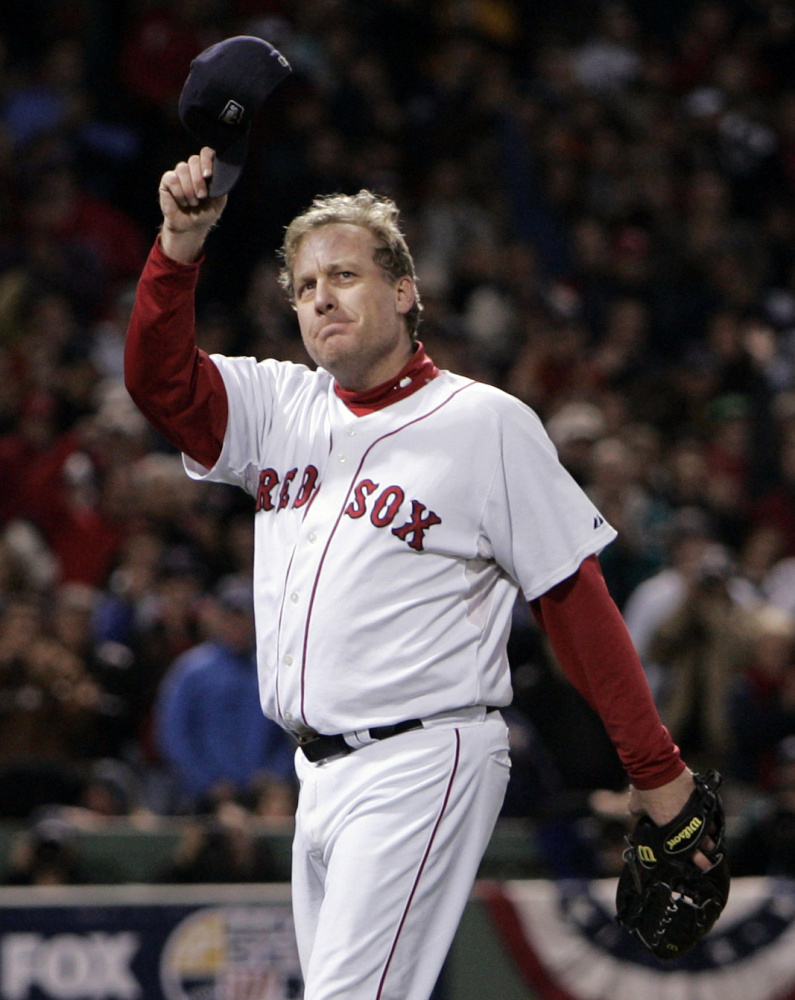The names we should hear when the 2017 Baseball Hall of Fame class is announced on Wednesday are Tim Raines and Jeff Bagwell, and maybe newcomers Ivan “Pudge” Rodriguez and Vlad Guerrero.
But during the voting process, the players we kept hearing about were Roger Clemens, Barry Bonds and Curt Schilling.
Clemens and Bonds represent the dilemma in the Hall voting. They are obviously two of the greatest players, but their names are synonymous with performance enhancing drugs.
Curt Schilling’s credentials are less clear-cut. He is also vocal in his opinions – always conservative, sometimes tasteless.
Clemens and Bonds make voters uncomfortable. Chances are good, that both were great without the PEDs, although their statistics would be less inflated.
But while both have been connected with using enhancers – through independent reports and court cases – they’ve never been disciplined by Major League Baseball – as others have, including Manny Ramirez, who is on the ballot for the first time this year, but has no chance after two failed drug tests.
This year, there has been a jump in support for Clemens and Bonds.
To reach the Hall of Fame, players need to receive 75 percent of the votes from the approximate 435 eligible voters – 10-year members of the Baseball Writers Association of America.
Last year – the fourth time both Bonds and Clemens were on the ballot – they received 44 and 45 percent of the vote, respectively. This year, with nearly half of the ballots made public, Bonds has 64 percent, Clemens 63.5 percent – according Ryan Thibodaux, who tracks Hall of Fame voting (www.bbhoftracker.com) from writers who have made their ballots public.
The hefty increase in support for Bonds and Clemens is, in part, because former commissioner Bud Selig was voted into the Hall last month. Selig’s election came via a 16-person panel of voters, not the BBWAA.
Selig was the commissioner when PED use was at its peak. Now we are hearing from sports writers that if Selig gets in, so should Bonds and Clemens.
That makes little sense, but it appears Selig’s induction gives writers an excuse to do what they’ve wanted to do all along, which was to vote for Bonds (762 home runs, 1.051 career OPS and seven MVP awards) and Clemens (354 wins, 4,672 strikeouts and seven Cy Young awards).
Bonds and Clemens are not likely to get into the 2017 class. Maybe next year, or the year after.
I would prefer it happens in 2022 – the 10th (and final) ballot for each of them. Maybe that sounds petty, but their actions tarnished the game. For that, they can wait.
In Schilling’s case, his numbers are less convincing. His 216 wins are tied for 85th all-time, and his career ERA is 3.46. But Schilling was a power pitcher with control – his 3,116 strikeouts ranks 15th, and his strikeout/walk ratio (4.4) is third-best all-time.
Schilling’s greatest value was in the postseason, with an 11-2 record, 2.23 ERA and three World Series titles.
Schilling received 52 percent of the votes last year, his fourth time on the ballot. This year, according to Thibodaux’s tracker, Schilling has not moved much, sitting at 53 percent. Compare that to pitcher Mike Mussina (270 wins, 3.68 ERA), who has gone from 43 percent last year to 61 percent.
Why is Schilling stuck? He will argue that sportswriters don’t like his politics – especially when sharing his views on talk radio, Twitter and the internet.
Schilling may not be gaining ground because of how his expresses his views. Last fall, Schilling re-tweeted out a picture of a T-shirt that read “Rope. Tree. Journalist. Some Assembly Required.” Schilling referred to the shirt as “so much awesome.”
When Schilling was criticized for encouraging jokes about lynching, he defended it as simply “sarcasm.”
I don’t think Schilling was really advocating lynching. But he was foolish. Should he lose Hall of Fame votes because of that? No.
It’s hard to tell if Schilling’s holding pattern in the voting is because of his mouth or his win total. I believe the strikeouts and the postseason excellence make Schilling a better candidate than what his vote totals are.
Maybe more time is needed. If voters can ignore Bonds’ and Clemens’ discretions, maybe they can tune out Schilling long enough to analyze his impact.
Send questions/comments to the editors.



